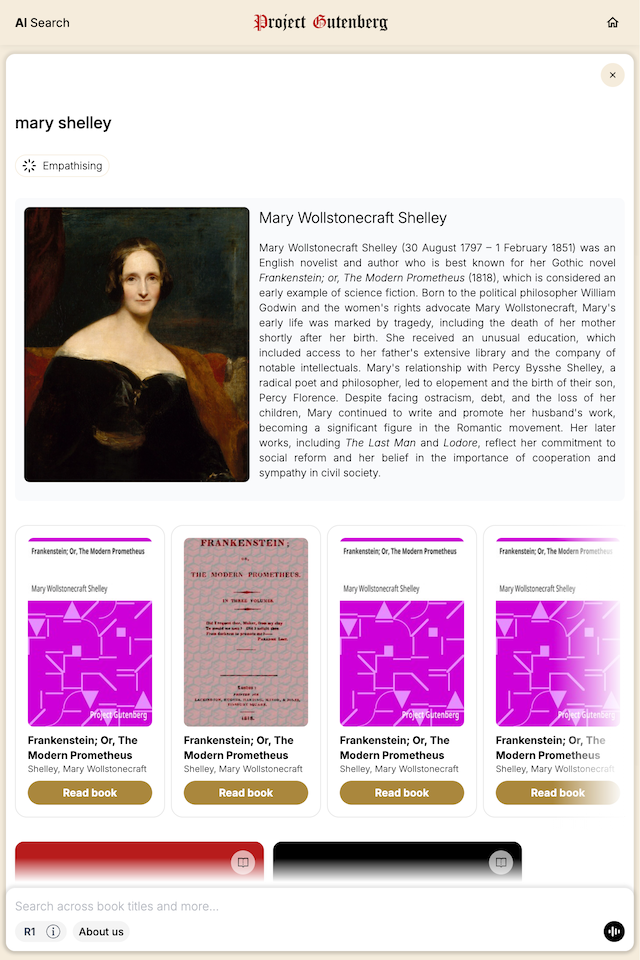AI tools for retail: Empowering bookstores with Project Gutenberg and Ethical AI
AI tools for retail: Empowering bookstores with Project Gutenberg and Ethical AI
It’s time to think of a world where the wisdom of classic literature meets cutting-edge commerce technology. Empathy.ai brings the best of both worlds: Project Gutenberg, a public-domain library full of timeless novels and poems, and a next-generation search and recommendation engine built for ethical, local commerce. Together, they help small shops support their communities, honor privacy, and delight readers in new ways.
Empathy.ai has built an interactive search interface that connects Project Gutenberg’s collection of 70,000+ free e-books with local book inventories to enrich discovery. Customers can ask natural questions like “recommend a mystery novel from the 19th century” and instantly discover related classics as well as nearby shops selling similar titles.

This AI-powered commerce search bridges public domain content and retail, turning serendipitous reading into an opportunity to drive engagement, allowing store owners to own the technology and customers to trust the answers. In practice, this means no shadowy data mining—only transparent, explainable AI working to enrich your store’s offerings.
The power of Open Knowledge: Project Gutenberg’s legacy
Empathy has lately started to carry out several Open Innovation initiatives to bring AI and commerce search together, such as the Healthy eating with Ocado demo and the Related Prompts feature. Most recently, we’ve been working on Project Gutenberg, whose mission is to democratize knowledge by making books free to access and download. Its volunteer-driven library offers classics like Don Quixote and Alice in Wonderland in multiple languages.
This means a treasure trove of content for small retailers to share with readers. Imagine a local bookshop featuring a display of free e-books as a value-add, or using excerpts from the public domain in newsletters and events. By aligning with this open knowledge resource, bookstores reinforce their literary roots and community spirit, while Empathy.ai provides the technology to connect customers with these works seamlessly.
Meet Empathy.ai: Ethical, privacy-first AI for retail
Empathy.ai is a series of AI capabilities specifically designed for commerce. It builds AI-powered search and recommendations that respect people’s privacy and promote trust.
Unlike generic AI that sends all data to big cloud providers, Empathy’s private large language models (LLMs) run on self-hosted, open-source models that are accessible in the Empathy.ai Hugging Face. The company’s ethos—part of the Ethical Commerce Alliance—is to “protect customer data and rebuild brand trust”.
For retailers, this means offering personalized shopping experiences within the customers’ privacy limits and data-sharing consent. In fact, Empathy advocates for a privacy-first personalization and 1:1 recommendations.
In short, this is Empathy.ai’s attempt to provide store owners with advanced AI capabilities that customers can enjoy when shopping in their boutiques and bookstores.
Practical AI use cases for retailers
Empathy.ai powers several practical features to boost engagement and sales. Key benefits include:
- AI-powered product search and discovery: Let customers find the right books and products by meaning, not just keywords. Empathy’s semantic search understands queries like “children’s books about friendship” or “classic science fiction novels” and delivers relevant results.
- Ethical recommendation engine: Provide personalized suggestions while honoring privacy. Instead of using invasive tracking, Empathy delivers curated recommendations based on on-site behavior and contextual AI putting privacy at the core.
- One-to-one suggestions: Pair a modern bestseller with a similar public-domain classic—all with data kept local and secure.
- Transparent AI explanations: Empathy.ai shows its work since its AI explains the chain of thought behind answers, supporting ethical principles like transparency, accountability, and trust.
In practice, a customer could ask, “Why is Alice following the rabbit?” and see a clear, sourced response. This transparency builds confidence in the AI— there’s no black box here—and educates users about books as they shop.
- Local commerce integration: Strengthen community ties by promoting nearby shops. Empathy.ai has integrated local bookstore catalogs via MotiveMarket into the search results.
For example, a reader who searches for a newer title not on Gutenberg, like The Hunger Games, might see local retailers that carry it. Empathy.co, thanks to Motive.co and MotiveMarket, promotes local retail stores and increases their visibility without charging fees or commissions. This means your store gets more exposure and your customers support local businesses—a win-win for the neighborhood.
- Community engagement tools: Power reader communities beyond search with Empathy’s tech. Imagine hosting a virtual book club where customers chat with an AI-powered “author” of Pride and Prejudice, or offering in-store kiosks where kids “ask” classic story characters questions. By making literature interactive, Empathy.ai helps bookstores build loyal customer communities around their favorite stories.
These AI tools for retail not only drive sales but also foster customer loyalty through respectful, enriching, and innovative experiences. When customers see a bookstore using ethical AI, they feel valued and understood—a powerful differentiator in the digital age.
Case study: The Old Oak Bookshop (fictional scenario)
The Old Oak Bookshop is a cozy independent store in a small town. Owner Maria integrated Empathy.ai into her online catalog. Now, when a customer searches “mystery novels set in London,” the site’s search bar, powered by Empathy, returns a mix of in-stock titles and related classics from Project Gutenberg—with easy options to download them for free. Next to each result, a note like “Click here to see this book at our store” drives foot traffic.
Meanwhile, Maria uses Empathy’s recommendation engine for personalized emails: a reader who bought a historical novel might get a suggestion for War and Peace (free from Gutenberg) alongside a related paperback available at the shop. Because Empathy.ai explains its reasoning, Maria can even share fun “Did you know?” facts from the classics in her newsletter. Within months, The Old Oak sees higher online conversions and deeper customer engagement—all while emphasizing its support for local authors and privacy-respecting practices.
Comparison: Traditional vs Ethical AI search
| Feature | Traditional commerce search | Empathy.ai |
|---|---|---|
| Data privacy | Tracks all user data (cookies) | Privacy-first: self-hosted, no hidden tracking. |
| Personalization | Algorithmic, black-box | Transparent 1:1 recommendations (user control and explainability). |
| Search method | Keyword-based, rigid filters | Semantic AI search: understand natural queries and context. |
| Book & content sources | Store’s inventory only | Public + private: blends local inventory with Project Gutenberg classics. |
| Local commerce supports | Limited local focus | Built-in local catalog: highlights nearby bookstores with the MotiveMarket integration. |
| Explainability | Opaque results | Chain-of-thought: AI shows how it thinks, building trust. |
| Ethical stance | Profit-driven, data-hungry | Values-driven: prioritizes fairness, community, and privacy. |
This comparison shows how an AI-powered commerce search like Empathy.ai can outperform generic solutions for small businesses. It’s designed to empower retailers, not profit off their data.
The future is ethical AI for bookstores
Empathy.ai and Project Gutenberg together illustrate a positive future for local commerce. By leveraging an ethically driven LLM on open literature, stores can amplify human values—protecting privacy, promoting fairness, and creating a more inclusive digital ecosystem.
Independent bookstores can step confidently into the AI era, using privacy-by-design tools that honor customers and the community. For store owners curious about AI tools for retail, the message is clear: support local businesses and customers, without sacrificing ethics or privacy. Explore how Empathy.ai’s AI-powered search and recommendation engines can turn your bookshop into a modern literary hub. Give your customers the gift of discovery—from classic novels in the public domain to your curated new titles—all with an AI that shows its work and respects their data.
Ready to open this new chapter for your store? Embrace privacy-first AI and start a conversation with your community—one book (and one customer) at a time.











